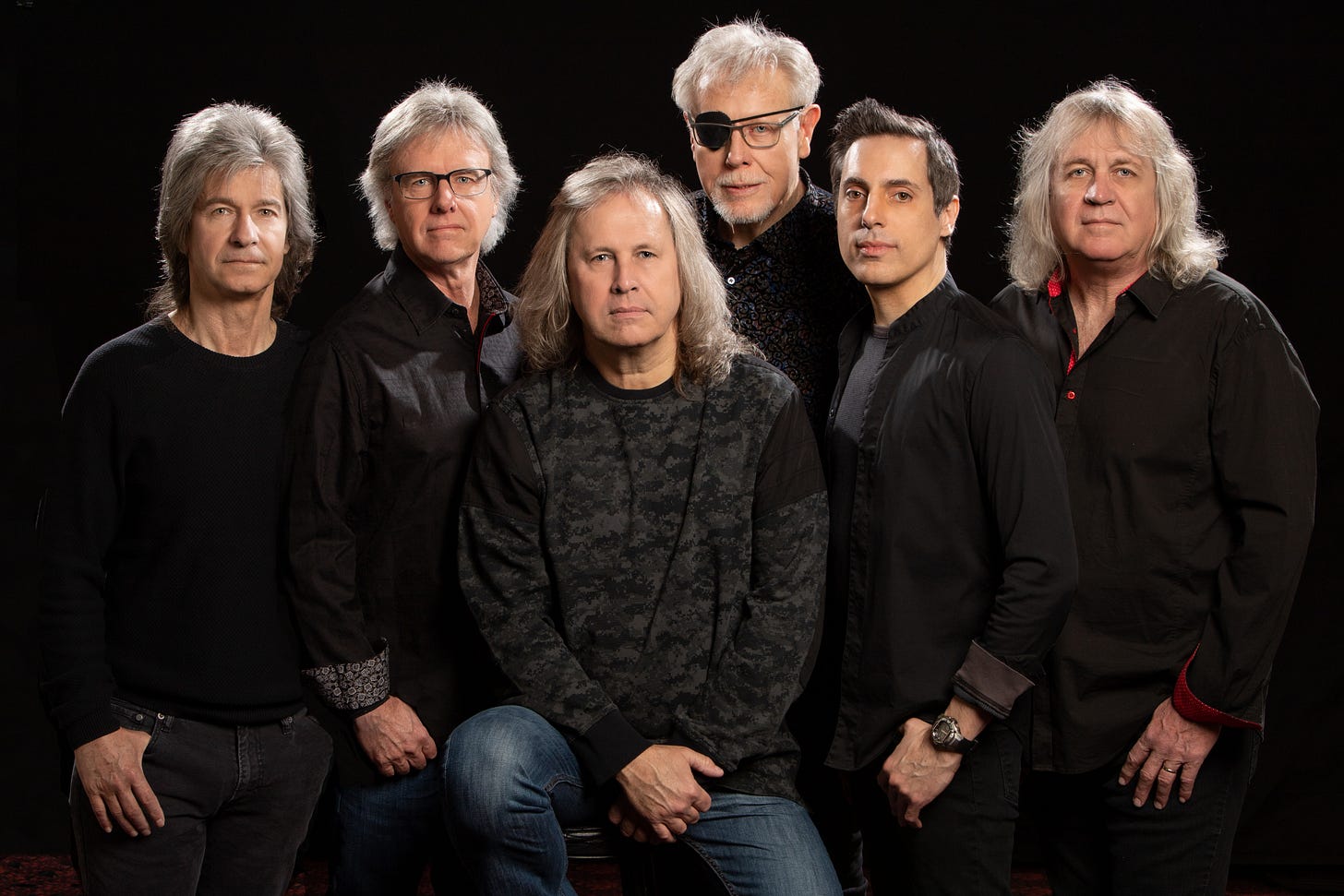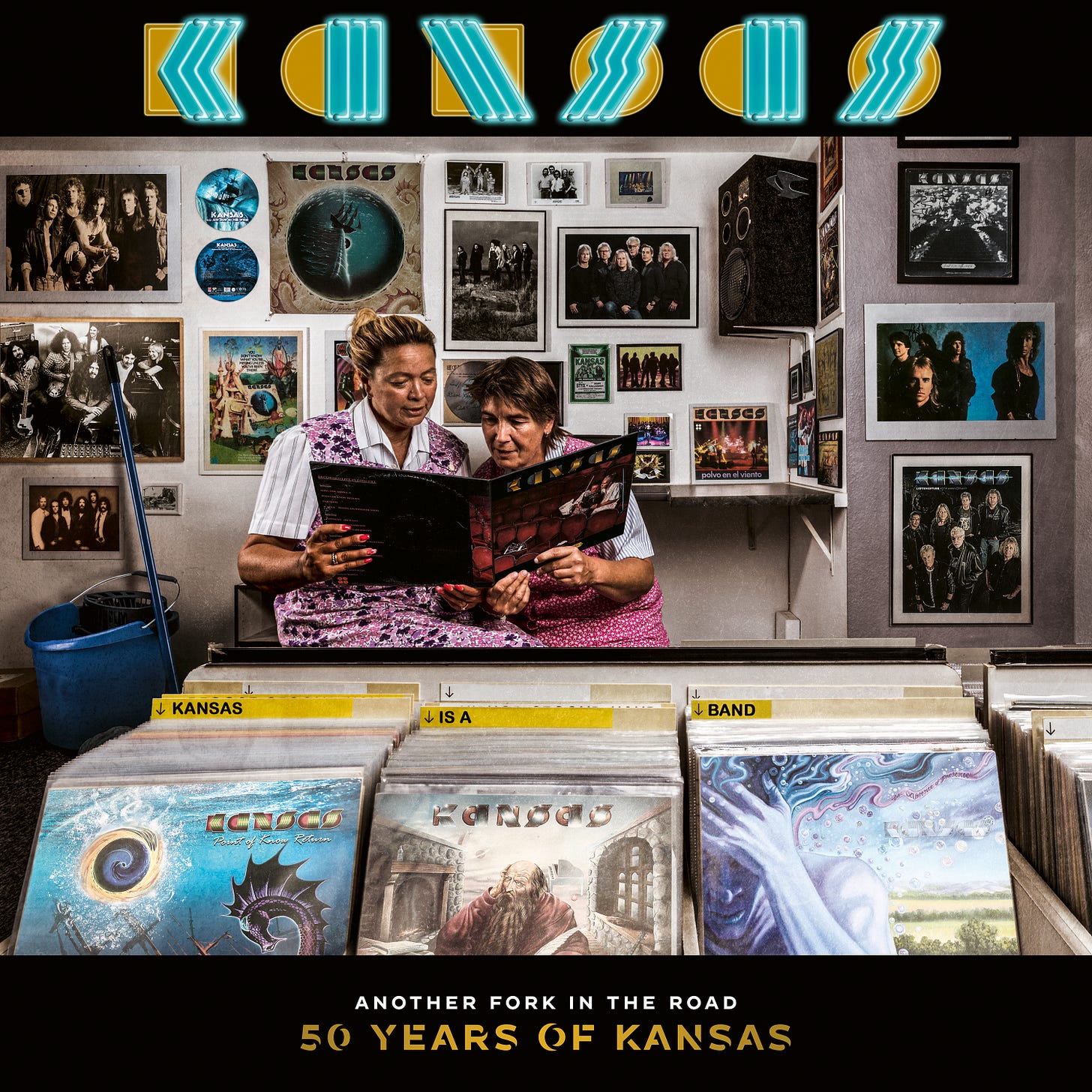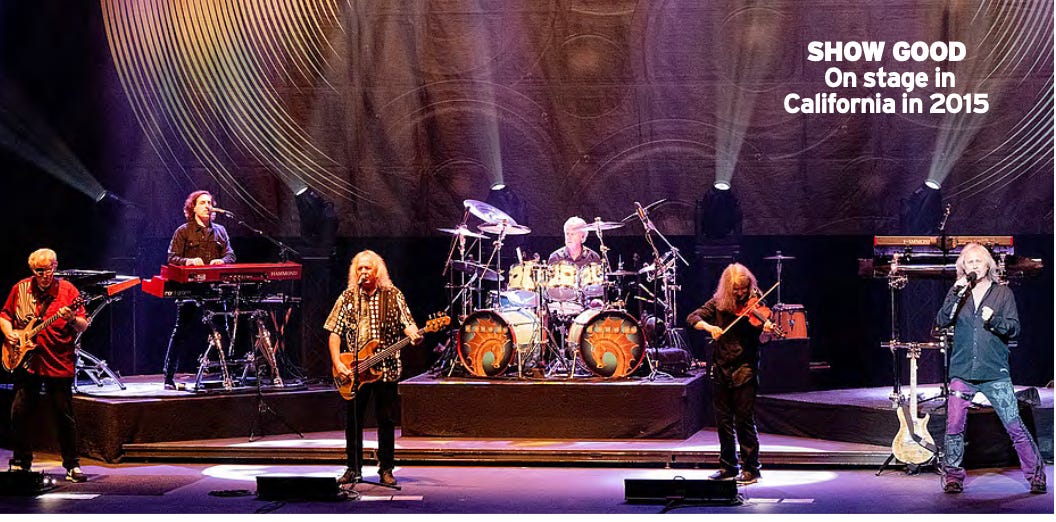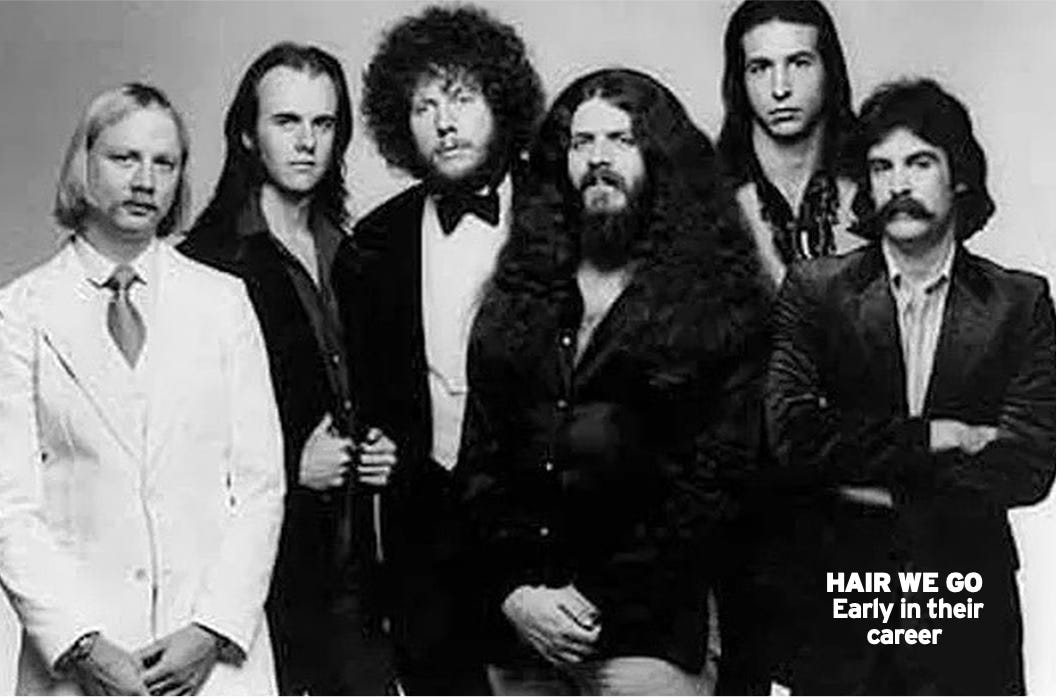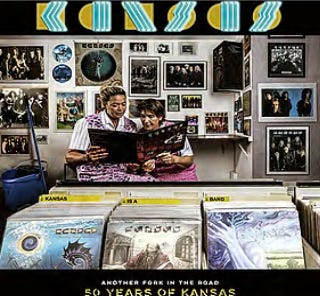Music Monday: Kansas
In an ongoing series of music interviews, here is one I conducted with the drummer from the legendary rock band Kansas, who formed 51 years ago and are still going strong...
It’s one of the most famous lines in movie history. In The Wizard of Oz, an awestruck Dorothy tells her cairn terrier, “Toto, I’ve a feeling we’re not in Kansas anymore.”
But you’d be mistaken if you thought that the band Kansas – best known for the massive hits Dust in the Wind and Carry On Wayward Son, which continues to be one of the top five most played songs on classic rock radio – would ever become sick of hearing it.
“Yeah, we’ve used that quote quite a few times, especially when we were leaving Kansas,” the band’s drummer Phil Ehart told me when we chatted on Zoom.
Kansas, one of America’s most iconic classic rock bands, whose catalogue of 38 million albums worldwide, celebrate their 50th anniversary in 2023.
To commemorate this landmark occasion, Kansas released a three-CD digipack collection titled Another Fork in the Road – 50 Years of Kansas. A career-spanning collection that features carefully selected tracks from across the band’s sizable discography as well as a newly recorded version of their classic hit Can I Tell You.
“Styles changed, and all of a sudden, you know, the ‘80s Hair God bands came in, and they took over everything,” he reflected. “And you and I are here talking about a band like Kansas with a 50-year career – are those other bands that were around in the ‘80s still around for 50 years?
“It’s been an amazing career – 50 years of playing drums in the same band. I’m very proud of what the band accomplished and what we did individually.”
He paused to chuckle. “I’ve never done anything else. I’ve never had a job. But I’ve talked to people that have a job. And playing drums in Kansas is a job. It’s a pleasure that I get to do that. It’s great, that’s all I know. I tell people it’s a pleasure to have a job that I enjoy doing,” he said.
“Yes, it’s hard to travel, you’ve missed your family and things. What did they
say that you do in a band? You play in a band – that’s what you do. I’m up there playing for three hours.
“They don’t say you’re up there working in a band. That’s the word they use, playing. So I don’t look at it as a job. Is it hard sometimes? Yeah. Can it be hot outdoors? Yep. Can it be tiring? Sure, but it’s always a joy.”
It’s perhaps somewhat ironic that he wasn’t even born in Kansas. “My dad was in the United States Air Force. He served as an Air Force brat; I lived in New Mexico, Tokyo, Philippines, and I moved every two or three years of my life. So, as soon as I was born, when I was two, I moved; when I was four, I moved; when I was eight…” he told me.
“And then we moved to the Philippines. We moved to Japan. We moved to Washington DC. We moved to Detroit, Michigan, and all around. And finally, when my dad retired we moved to Kansas. And that’s how I ended up in [the band] Kansas.
“Some of the guys were originally from Kansas, but I’m not really from anywhere. I don’t have a hometown. So people say, ‘Where are you from? Kansas?’ I’ll say, and that works, because I’ve spent a lot of time there.”
Phil had itchy feet in his formative years. After getting bored with the local music scene, he jumped ship to London in the early ‘70s.
“Topeka was a very small town and I had kind of played with everybody in the bands and there was just really nobody left for me to play with. So, I decided to go to London and just see what was over there,” he recalled.
“I lasted for about five or six weeks, and came back to Topeka and ended up playing with the guys I had left. But that’s when I put Kansas together. When I came back from London I called the guys that were in the band and we started the band Kansas together. So, yeah, it all worked out.”
Did he meet any interesting bands during that time in England?
“The only guys that I met was the guys in Wishbone Ash. I thought I might have to sell my drum set. So, they wanted to see it,” he said.
“I took my drum set over there. They didn’t end up buying it. My dad found out and he said, ‘No, you’re not going to sell your drum set. So, he sent me the money to come back but they were the only ones that I met and that was it, ‘Hey, how you doing?’ It isn’t like we became friends, but I was a fan of their band, that was a big band back then.”
Phil was never what you’d call a Wayward Son. “I don’t drink. I just didn’t have any interest. It wasn’t anything that I was missing, you know,” he reflected.
“And the other guys did [drink], but I was just like, ‘You know, it’s just not for me’. I never judged anybody that did it; it wasn’t like, ‘You’re going to hell, or something’.”
Phil and guitarist Rich Williams are the band’s original lineup. “We have a different way of looking at it, that Kansas was never about the people. Kansas was always about the music,” he said.
“I mean, Kerry Livgren, who wrote the majority of our material, hasn’t been in the band for 40 years. He lasted about 10 or 11 years and then retired and went into other things that he wanted to do.
“He’s been gone a long time and we have his music, we have the music, and that’s what people come to hear. I don’t think they come to see particular members, they come to hear the music done well and done professionally, and that’s what we offer.
“We [Rich and I] just happen to be original members. But Billy Greer, our bass player, he has been with us for 40 years. He’s been with us longer than any of the original members, other than me and Rich.”
Even “the fans will look at” Billy as practically being an original band member, he stressed. It’s a fair point. “You know, he’s been up there for 40 years. And some of the other guys, even though they are original, they weren’t around as long. David Ragsdale, our violinist, he’s been with us for 20 years. So, we’re very fortunate to have a very good band,” he added.
Will there ever be a reunion with their old bandmates?
“No, there won’t. What we did is, we did a reunion documentary. And we got the original band back together and we told the story from starting out in Kansas, all the way through the album Point of No Return [album],” he answered.
“After Point Of No Return, that’s where we stopped the story. But it was a story about just a bunch of local farm kids that grew up and became a very famous band, and we ended the documentary with Point Of No Return even though our career continued. So, we did that instead of a reunion tour. There were a lot of interesting parts. We hadn’t been together in the same room for like 20 or 30 years, you know.
“It was the first time we sat down and looked across the room at each other, and we had a lot of fun. There was no hard feelings. We spent about two or three days making the documentary. And we made it in our hometown, Topeka. So there was a lot of us going back to our hometown and sitting there as Kansas. Four of the six went to high school together. It was one of the best things the band’s ever done.”
Reflecting on why some original band members left, he said: “Well, I think people just had other things they wanted to do. You know, some of the guys wanted to get married and have kids. Some of the guys went into another career. One of the guys started his own solo project. “I mean, we played hundreds of shows a year. And that’s not for everybody. People aren’t that crazy at being gone all the time.
“We came out in the ‘70s and by the ‘80s some of the guys were already tired of it. And so they moved on to other things. And that happens to a lot of hands. We understood. I’m still in touch with all the guys, all the original members.”
Does Phil have a favourite song and album?
“There’s a lot that I really like, probably my favourite song, drum-wise to play, is Carry On Wayward Son. And that song is an awful lot of fun to play every night and always gets a great response. And everybody’s singing along. It’s a great song,” he said proudly.
He “would have to probably say” Leftoverture is his favourite album. “And our last one we just did called The Absence Of Presence, that’s one of my favourite albums we’ve ever done. And we just did that in the last couple of years,” he continued.
“We try to stay current and put out new records. But, mainly, we’re a road band. We play a lot of concerts. That’s what we liked the most, our concerts.”
What genre does Phil reckon Kansas belong in? Wikipedia has them pegged as a prog rock band.
“You know, some people said we were a symphonic rock band because of the violin, and that was kind of thrown around for a while. We’re kind of hard to categorise. We really are. You can’t [easily] put Kansas into a certain category But we’re a rock band,” he maintained.
Phil is rightfully proud of the band’s place in rock ‘n’ roll history. “We came from a small town. We had to keep going out and playing as many dates as we could, and we’d play 100/120 shows a year. I think we were so young and dumb that we didn’t have time to be crazy,” he concluded.
“And then we started hooking up as an opening band, playing with Bad Company and playing with Mott The Hoople. And then along came Queen. And we went out on two tours with Queen and that really broke us, you know, because that was the Sheer Heart Attack tour.
“We got to meet a lot of the up-and-coming bands and playing with Lynyrd Skynyrd and, of course, with Six and Journey and all those bands coming through that time period. I got to play with Rush. Rush opened for us for a tour or so. You know, to go out and open for Yes, and stuff like that.
“And the ‘70s was probably the most creative time for music around the world. It was not just the States, it was Europe, it was everywhere. A lot of great bands were coming up – we were right in the middle of it. It was just an incredible time.”
■Another Fork In The Road – 50 Years Of Kansas is out
now on CD via InsideOutMusic label




